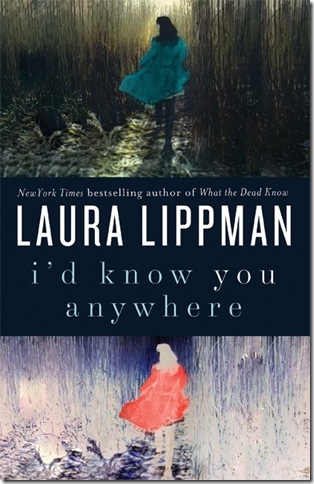I doubt Laura Lippman would want me to say this out loud, but she’s not a mystery writer anymore.
Oh, sure, the talented Ms. Lippman, a former reporter for the Baltimore Sun, is a mystery writer when she’s producing the popular, award-winning series featuring private eye Tess Monahan. But her stand-alones – there are five of them now – are something else again.
Her latest, I’d Know You Anywhere, doesn’t even stand as a thriller, unless the mere presence of suspense qualifies. Nor is it conventional crime fiction, though crime does figure, and it is, of course, fiction. But if I’d Know You Anywhere isn’t a mystery or a crime novel, then what is it?
Using Holmesian logic (“When you have eliminated the impossible, whatever remains, however improbable, must be the truth”) I conclude that any book so utterly lacking in genre convention as I’d Know You Anywhere is, by definition, literary fiction. It is certainly the kind of novel that merrily complicates the eternal debate over the genre divide.
Consider a recent essay in the London Guardian, wherein an acclaimed British novelist named Edward Docx sets out to clear up the genre vs. literary muddle for us once again. After pointing out how lousy Dan Brown or Stieg Larsson actually are, he proceeds to dismantle genre writing as a whole: “[E]ven good genre (not Larsson or Brown) is by definition a constrained form of writing. There are conventions and these limit the material. That’s the way writing works, and lots of people who don’t write novels don’t seem to get this.”
This is all nicely elitist, as any argument in favor of the supremacy of literary fiction ought to be. Docx’s bracing corrective presents simple aesthetic truths that, somehow, need to be restated every few years (or perhaps weeks). In fact, I’ve written similar things in the past, and I find myself nodding in agreement – all the while something inside is furrowing its brow, stammering, “And yet, and yet…”
And yet no matter how persuasive Docx’s thesis might be, he necessarily carries his truth in a leaky wineskin. The scope of his argument allows no room for some of the distinct virtues of genre fiction – the lurid energy of pulp, for example, or the highly useful idea-mongering of science fiction, or for the places Jim Thompson, Eric Ambler, James M. Cain, Charles Willeford (to name but a very few) take us with ease, but which seem off limits to most literary writers, who have their own constraints, truth be told.
his truth in a leaky wineskin. The scope of his argument allows no room for some of the distinct virtues of genre fiction – the lurid energy of pulp, for example, or the highly useful idea-mongering of science fiction, or for the places Jim Thompson, Eric Ambler, James M. Cain, Charles Willeford (to name but a very few) take us with ease, but which seem off limits to most literary writers, who have their own constraints, truth be told.
Take The Great Gatsby: Fitzgerald’s depiction of Gatsby as a mobster is the least authentic (and also the least important) aspect of this otherwise sterling little classic. On the other hand, some few literary writers are quite at home with thrilleresque themes and characters. Hemingway, for example, virtually invented gangster-speak in his short story The Killers (read this story, then watch any noir film from the ’30s or ’40s), and the pulpiest parts of To Have and Have Not, featuring the smuggler Harry Morgan, are by far the most successful bits of this otherwise failed novel.
And what, Mr.Docx, are we to make of writers the likes of Joyce Carol Oates, Richard Price, Albert Camus, Barbara Vine, Dan Choan, Elmore Leonard, Denis Johnson, Len Deighton, Graham Greene, Somerset Maugham, Stephen King, Kate Atkinson, and innumerable others, some coming from the literary side, some from the genre side, and all meeting in that portion of the Venn diagram where fascination with crime and morbid psychology shade into writerly excellence?
In truth, much more intercourse takes place between literary and genre fiction than critics like Docx care to acknowledge. And Lippman’s I’d Know You Anywhere is a brilliant example of the kind of novel that snaps Docx’s rule in half. Focusing on Eliza Benedict, an affluent stay-at-home mom (with a secret!) in Bethesda, Md., the novel thwarts genre expectation at every turn.
Married to a former journalist who has gone over to corporate communications, Eliza and her family have returned from nearly two decades in England. She’s just settling in to her new surroundings when she gets an unwanted letter from an old acquaintance, Walter Bowman, who has seen her picture in a society magazine. “Of course you are an older woman now,” Bowman writes from Virginia’s death row. “Still, I’d know you anywhere.”
When Eliza was 15, it quickly transpires, Bowman, a serial rapist who murdered his victims, kidnapped her when she came upon him burying a body in the woods. He forced her to travel with him for six weeks, until he kidnapped and killed another girl, and was finally caught.
Against her better judgment, Eliza eventually decides to correspond with Walter, who claims to be a changed man in search of forgiveness. He also promises to reveal the location of more bodies for the benefit of families still grieving in uncertainty. But Eliza also has unresolved conflicts about why Walter did not kill her, and why she did not try to escape when he left her unwatched.
Every major character is fully drawn, and most minor ones (Eliza’s husband is the sole cipher, but he doesn’t matter much). These include not only Eliza and Walter – a wonderful creation, full of cunning and self-deceit – but also an unstable prisoner’s advocate, and the embittered mother of a victim who blames Eliza for her daughter’s murder.
Lippman toggles neatly between the present and 1985, when Eliza was a plain, Madonna-obsessed girl in the shadow of a more brilliant sister. She knows she wasn’t, as some critics claim, Walter’s girlfriend. But why, then, did he let her live? Why was she so passive? What hold does he still have over her? And ultimately, will she join the effort to get his death sentence commuted to life in prison?
The psychological and emotional richness of I’d Know You Anywhere is its secret narrative engine. Eliza is an imperfect heroine, yet she’s all the more believable for her weaknesses. And the resolution, as suppressed memories rise to the forefront of Eliza’s mind, is also more satisfying for being both hard-earned and exactly life-sized.
Chauncey Mabe is the former books editor of the Sun-Sentinel. He can be reached at cmabe55@yahoo.com.
I’d Know You Anywhere, by Laura Lippman; 384 pp., William Morrow, $25.99.
